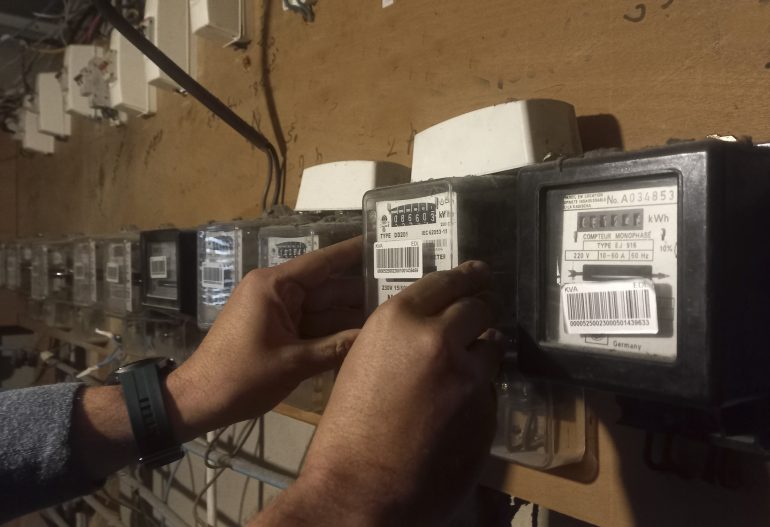The electricity crisis in Lebanon is flowing in a new path post decision of the Ministry of Energy and Water to collect the monthly bills in US dollars.
The Lebanese has been waiting with hope for an effective solution of the electricity chronic outage for decades despite the continuous failure of the successive governments to reform the electricity sector, which costs the state billions of dollars and deplete its resources without attaining effective solutions.
Last August, the Board of Directors of the” Electricité du Liban” has implemented new tariff of the electricity for the first time since the 1990s, under the framework of the “National Emergency Plan for the Electricity Sector”, complimenting the government directives and in coordination with the concurrence of the Ministry of Energy and Water and the Ministry of Finance. The ministry of electricity psychologically prepared the citizens by circulating a statement of the new tariff, explaining how to calculate their bills.
Electricity bills issuance in US dollar is unacceptable additional burden to Lebanese people and outside their capabilities, at a time where the currency value has been significantly dropped and the market fluctuation is out of control as a new records in the Lebanese history .
Status Quo
The Lebanese citizens struggling for ages by paying double electricity bills to the public sector and private sector. The private sector electricity was historically the ideal alternative solution for the Lebanese since the consistency of its service has been met the Lebanese needs in spite the high tariff in contrast to the public sector bills. Currently the average private sector bill (5 amp) represent 10 million pounds and its consistently increasing depending on the currency fluctuation and pound collapse thus , the burden of two electricity bills priced according to US dollar rate cannot be afforded by the citizens.
According to the ministry, the energy pricing starts at 10 cents per kWh for the first 100 kW, and 27 cents per kWh for consumption above that, in addition to a fixed monthly tariff of 21 US cents per amp and $4.3 qualification allowance, while the kWh cost was previously 135 Lebanese pounds, and a fee allowance of about 25 thousand pounds, meaning that the value of the bills ranged between 50 and 300 thousand pounds.
The matter does not stop at this point, as the new price is not fixed, as it will be calculated on the exchange rate of the “Sayrafa” platform, where the change of pounds to the US dollar is not stable, plus a 20%.
Is There A Solution?
In the recent period, civil association and several lobbies called for a boycott of paying bills in dollars, where they described the government announcement as illegal action for funding the treasury by adding extra liabilities on the citizens end, which brings the importance of adopting a strategic plan, based on using the renewable energy to obtain electricity.
The Solar system is critical solutions for the citizens as well as the state gradually switching to a solar system is in line with the strategic plan of the government. for example, during the COP27 climate conference in Egypt, Lebanon reaffirmed pledges to source 30 per cent of its energy from renewable by 2030. Moreover, industry experts see that the international financing for 11 solar projects approved in May 2022 from the united nations is also depend on the finalization of a $3bn IMF rescue package. The package is itself contingent on reforms, including at EdL, that have yet to be adopted by the caretaker government. Thus, one of the most important benefits to get out from the Finance and economic crises, revolve around the general trend towards the use of alternative energy.
Solar System Isn’t A Luxury
Solar system is no longer a luxury to have. It’s a must. In fact, the Lebanese can now install solar panels, and taking advantage of several options offered by the state in particular, as it allowed the possibility of obtaining loans with simple interest rates.
The loans of up to $13,000 for distributed solar with 5-year repayment period, intend to alleviate high energy bills; financial backing of public-private Banque de L’Habitat with oversight from Lebanese Center for Energy Conservation.
Lebanese began getting their first loans to install small solar plants on rooftops, in a program that aims to help low- and middle-income people make such installations. Its intent is to lower their power bills by diversifying into renewable solar.
The value of each loan ranges between 75 and 200 million Lebanese Pounds (LBP) per person ($5000 – $13,000), provided that it does not exceed 80% of the project cost, with an annual interest rate of 4.99%, and a repayment period of 5 year. So, installing a five-amp solar panel can cost a one-off payment of between $2,000 and $2,500.
Therefore, these many changes taking place, whether negative, such as the imposition of pricing electricity bills in dollars, or positive ones, related to loans granted by financial institutions, constitute an opportunity for the citizens to reconsider installing solar energy as a primary and primary option.






